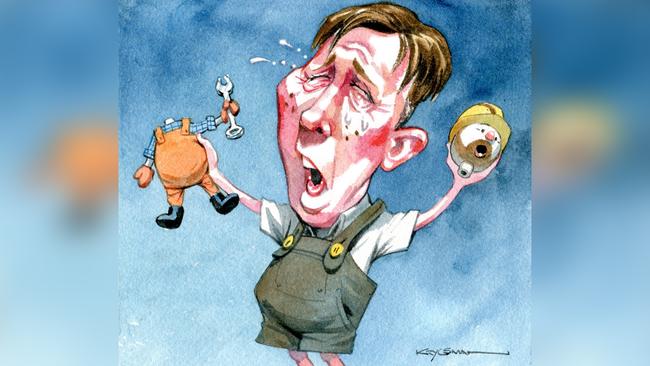
She may be regarded as one of the most powerful people in Australia, but ACTU secretary Sally McManus is not capable of altering the forces of supply and demand in the labour market.
She may think that changing the laws that govern industrial relations can boost wages. And in the short term that may be possible. But the adverse consequences for business start-ups, business investment and marginal workers mean that any gains will be temporary.
It is surely ironic that the ACTU’s Change the Rules! campaign is all about changing the rules that the trade union movement insisted were implemented by the federal Labor government that was elected in 2007. (Beware any slogan that uses an exclamation mark; it is always dubious.)
The Fair Work Act is the ACTU’s statute. Subsequent amendments to the Fair Work Act were made at the behest of the ACTU.
The ACTU is like an indulged toddler who has been given too many toys and treats. The toys are now broken and the treats have been eaten. So the demand is for different toys and different treats.
Let us not forget that, by rights, trade unions should be facing a crisis of legitimacy. The rate of unionisation has been in free-fall for almost three decades. Private sector unionisation is below 10 per cent. Were it not for teachers and nurses who maintain their trade union membership to obtain discount professional indemnity insurance, the overall rate of unionisation would be lower still.
But because of the link between trade unions and the Labor Party, the influence of the trade unions remains significant. And by divorcing their business models from membership numbers and dues, the most important unions have never been stronger financially.
For all the whingeing about enterprise bargaining, this has been the principal route whereby unions have been able to secure extra revenue to build up their financial bases. Think here superannuation, union-provided training, redundancy schemes, income protection insurance commissions and several other income streams.
So what rules does the ACTU want to change? The shopping list is long, but topping it is: a shift to industry bargaining away from enterprise bargaining; easy access to arbitration; unrestricted right to strike and right of workplace entry; and much higher minimum wages.
Notwithstanding the fact the Fair Work Act already provides for industry-wide bargaining for low-paid workers, this hasn’t produced the outcomes the ACTU has wanted.
The trouble is that most workers in most industries are simply not prepared to go out on strike apart from the occasional day of protest. You may have noticed, for instance, that some childcare workers will refuse to turn up at work once a year or so to lodge their objection to their rates of pay. But they are back at work the next day, having caused a degree of inconvenience for parents.
The economics of this ACTU claim — if you want to flatter it with this description — is that the demand for workers is less responsive to wages at the industry level than at the enterprise level because enterprises compete with each other.
At least McManus is being honest in saying that she wants to remove competition from the equation. She also has some weird idea that there is no further scope for productivity improvements in most industries, underpinning the point that economics is not her strong suit.
What she really fails to acknowledge is that there are no magic puddings in the jobs market. For industries that are in the traded goods sector, the ACTU recipe is a highway to job losses and firm closures.
In the case of the non-traded goods sector, there are those firms that are essentially reliant on government funding: childcare and aged care are two examples. Unless the government — the taxpayer — comes to the party to fund much higher rates of pay, the ACTU policy would again lead to job losses and firm closures.
More government funding of these sectors means higher taxation that will restrict consumer spending, including on goods and services produced by other firms in the non-traded goods sector.
It’s back-to-the-future stuff, based on the spurious notion that adjusting wage-setting regulations can alter rates of pay in the long run without adversely affecting business investment and job prospects.
And in this fantasy world, the ACTU wants an even more reliably stacked Fair Work Commission to significantly ramp up the national minimum wage (and the many thousands of award rates of pay that are adjusted in line with it) to provide a living wage based on subjective assessments of cost of living.
Forget the capacity of firms to pay; just figure out what workers and their families need and the FWC can wave its wand.
This is just the old days on steroids, reinventing the Harvester decision of 1907 in which it was decided that 7 shillings a day was enough for a man, his dependent wife and three children. McManus may have to update the dependent wife bit.
But what is often forgotten about this decision is the explicit intention for the arbitrated basic wage to form the basis of adjusting tariff protection for the affected firms. In return for being insulated from the brutal force of competition from imported goods, firms would be expected to pay the stipulated rates of pay. It was protection all around.
It took us many decades to realise the folly of this arrangement and the associated decline in our relative living standards.
The fact it was a Labor prime minister, Bob Hawke, who decided enough was enough and dismantled tariffs and other protective devices affecting industry tells us a lot. And note that Hawke had been president of the ACTU when it was a well-known and respected institution.
There are a few economic hardheads in the federal Labor Party who know that the ACTU agenda should be resisted. And it is telling that Bill Shorten hasn’t immediately agreed to all the claims.
But given the financial, organisational and personal links between the Labor Party and the union movement — is it too much to say that the Labor Party is just a wholly owned subsidiary of the unions? — it is probably only a matter of time before the ACTU claims become Labor policy.
Sadly, we will all bear the consequences over time should Labor enact the changes.



